
John Wood Campbell Jr. was an American science fiction writer and editor. He was editor of Astounding Science Fiction from late 1937 until his death and was part of the Golden Age of Science Fiction. Campbell wrote super-science space opera under his own name and stories under his primary pseudonym, Don A. Stuart. Campbell also used the pen names Karl Van Kampen and Arthur McCann. His novella Who Goes There? was adapted as the films The Thing from Another World (1951), The Thing (1982), and The Thing (2011).
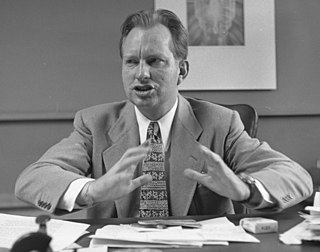
Lafayette Ronald Hubbard was an American author and the founder of Scientology. A prolific writer of pulp science fiction and fantasy novels in his early career, in 1950 he authored Dianetics: The Modern Science of Mental Health and established organizations to promote and practice Dianetics techniques. Hubbard created Scientology in 1952 after losing the intellectual rights to his literature on Dianetics in bankruptcy. He would lead the Church of Scientology – variously described as a cult, a new religious movement, or a business – until his death in 1986.

Xenu, also called Xemu, is a figure in the Church of Scientology's secret "Advanced Technology", a sacred and esoteric teaching. According to the "Technology", Xenu was the extraterrestrial ruler of a "Galactic Confederacy" who brought billions of his people to Earth in DC-8-like spacecraft 75 million years ago, stacked them around volcanoes, and killed them with hydrogen bombs. Official Scientology scriptures hold that the thetans of these aliens adhere to humans, causing spiritual harm.
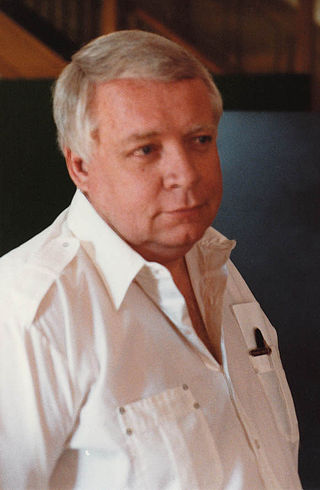
Algirdas Jonas "Algis" Budrys was a Lithuanian-American science fiction author, editor and critic. He was also known under the pen names Frank Mason, Alger Rome in collaboration with Jerome Bixby, John A. Sentry, William Scarff and Paul Janvier. In the 1990s he was the publisher and editor of the science fiction magazine Tomorrow Speculative Fiction.
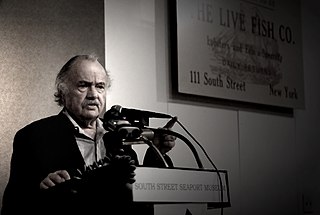
Ronald Joseph Goulart (; was an American popular culture historian and mystery, fantasy and science fiction author.
In American science fiction of the 1950s and '60s, psionics was a proposed discipline that applied principles of engineering to the study of paranormal or psychic phenomena, such as extrasensory perception, telepathy and psychokinesis. The term is a blend word of psi and the -onics from electronics. The word "psionics" began as, and always remained, a term of art within the science fiction community and—despite the promotional efforts of editor John W. Campbell, Jr.—it never achieved general currency, even among academic parapsychologists. In the years after the term was coined in 1951, it became increasingly evident that no scientific evidence supports the existence of "psionic" abilities.

Unknown was an American pulp fantasy fiction magazine, published from 1939 to 1943 by Street & Smith, and edited by John W. Campbell. Unknown was a companion to Street & Smith's science fiction pulp, Astounding Science Fiction, which was also edited by Campbell at the time; many authors and illustrators contributed to both magazines. The leading fantasy magazine in the 1930s was Weird Tales, which focused on shock and horror. Campbell wanted to publish a fantasy magazine with more finesse and humor than Weird Tales, and put his plans into action when Eric Frank Russell sent him the manuscript of his novel Sinister Barrier, about aliens who own the human race. Unknown's first issue appeared in March 1939; in addition to Sinister Barrier, it included H. L. Gold's "Trouble With Water", a humorous fantasy about a New Yorker who meets a water gnome. Gold's story was the first of many in Unknown to combine commonplace reality with the fantastic.
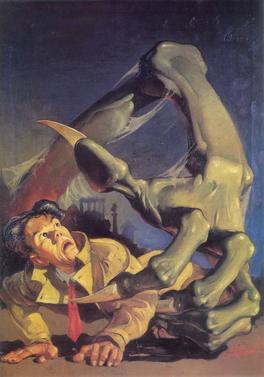
Edward Daniel Cartier, known professionally as Edd Cartier, was an American pulp magazine illustrator who specialized in science fiction and fantasy art.

History of Dianetics and Scientology begins around 1950. During the late 1940s, L. Ron Hubbard began developing a mental therapy system which he called Dianetics. Hubbard had tried to interest the medical profession in his techniques, including the Gerontological Society, the Journal of the American Medical Association, and the American Journal of Psychiatry, but his work was rejected for not containing sufficient evidence of efficacy to be acceptable.

OT VIII or OT 8 is the highest current auditing level in Scientology. OT VIII is known as "Truth Revealed" and was first released to select high-ranking public Scientologists in 1988, two years after the death of Scientology's founder, L. Ron Hubbard. OT VIII is only delivered to members of the Church of Scientology in one place—aboard the organization's private cruise ship, the Freewinds. There are a few advanced auditors that are able to deliver the level to those who meet the prerequisites.

Battlefield Earth: A Saga of the Year 3000 is a 1982 science fiction novel written by L. Ron Hubbard, founder of Scientology. He also composed a soundtrack to the book called Space Jazz.

Final Blackout is a dystopic science fiction novel by American writer L. Ron Hubbard. The novel is set in the future and follows a man known as "the Lieutenant" as he restores order to England after a world war. First published in serialized format in 1940 in the science fiction magazine Astounding Science Fiction, Final Blackout was published in book form in 1948 by The Hadley Publishing Co. Author Services Inc. published a hardcover edition of the book in 1988, and in 1989 the Church of Scientology-affiliated organization Bridge Publications said that a film director named Christopher Cain had signed a contract to write and direct a movie version based on the book.
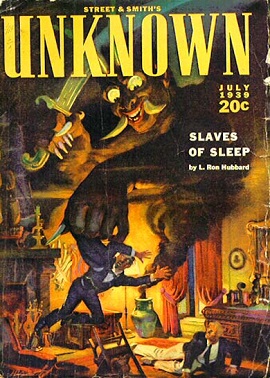
Slaves of Sleep is a science fantasy novel by American writer L. Ron Hubbard. It was first published in book form in 1948 by Shasta Publishers; the novel originally appeared in a July 1939 issue of pulp fantasy fiction magazine Unknown. The novel presents a story in which a man travels to a parallel universe ruled by Ifrits. The protagonist takes on the identity of a human in this dimension, and becomes involved in the politics of Ifrits in this fictional "Arabian Nights" world.

To the Stars is a science fiction novel by American writer L. Ron Hubbard. The novel's story is set in a dystopian future, and chronicles the experiences of protagonist Alan Corday aboard a starship called the Hound of Heaven as he copes with the travails of time dilation from traveling at near light speed. Corday is kidnapped by the ship's captain and forced to become a member of their crew, and when he next returns to Earth his fiancée has aged and barely remembers him. He becomes accustomed to life aboard the ship, and when the captain dies Corday assumes command.
Lafayette Ronald Hubbard, better known as L. Ron Hubbard, was an American pulp fiction author. He wrote in a wide variety of genres, including science fiction, fantasy, adventure fiction, aviation, travel, mystery, western, and romance. His United States publisher and distributor is Galaxy Press. He is perhaps best known for his self-help book, the #1 New York Times bestseller Dianetics: The Modern Science of Mental Health, and as the founder of the Church of Scientology.
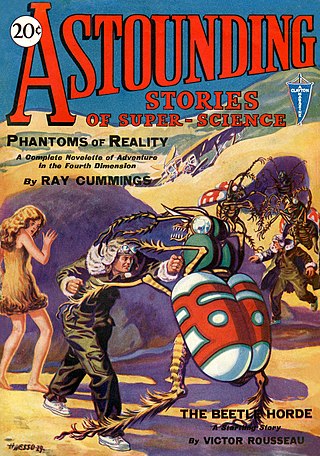
Analog Science Fiction and Fact is an American science fiction magazine published under various titles since 1930. Originally titled Astounding Stories of Super-Science, the first issue was dated January 1930, published by William Clayton, and edited by Harry Bates. Clayton went bankrupt in 1933 and the magazine was sold to Street & Smith. The new editor was F. Orlin Tremaine, who soon made Astounding the leading magazine in the nascent pulp science fiction field, publishing well-regarded stories such as Jack Williamson's Legion of Space and John W. Campbell's "Twilight". At the end of 1937, Campbell took over editorial duties under Tremaine's supervision, and the following year Tremaine was let go, giving Campbell more independence. Over the next few years Campbell published many stories that became classics in the field, including Isaac Asimov's Foundation series, A. E. van Vogt's Slan, and several novels and stories by Robert A. Heinlein. The period beginning with Campbell's editorship is often referred to as the Golden Age of Science Fiction.

Typewriter in the Sky is a science fantasy novel by American writer L. Ron Hubbard. The protagonist Mike de Wolf finds himself inside the story of his friend Horace Hackett's book. He must survive conflict on the high seas in the Caribbean during the 17th century, before eventually returning to his native New York City. Each time a significant event occurs to the protagonist in the story he hears the sounds of a typewriter in the sky. At the story's conclusion, de Wolf wonders if he is still a character in someone else's story. The work was first published in a two-part serial format in 1940 in Unknown Fantasy Fiction. It was twice published as a combined book with Hubbard's work Fear. In 1995 Bridge Publications re-released the work along with an audio edition.

Dead Men Kill is a pulp fiction mystery/zombie story written by L. Ron Hubbard. It was first published in 1934 in the July issue of Thrilling Detective magazine.

Scientology is in part derived from, and shares elements with, a number of esoteric or occult systems. The extent of the influence of specific occult belief systems on Scientology is a subject of debate amongst scholars.
Excalibur is an unpublished manuscript written in 1938 by L. Ron Hubbard, later the founder of Scientology. The contents of Excalibur formed the basis for Dianetics: The Modern Science of Mental Health (1950) and some of Hubbard's later publications.














